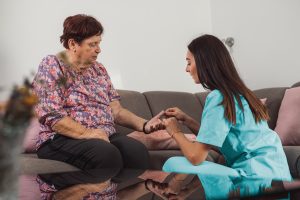
No objective test for PD exists. PD is more common in people age 60+. Talk to your doctor if you have two or more of the following:
- Tremor – Have you noticed a slight shaking in your finger, thumb, hand, or chin? A tremor while at rest is a common early sign of PD.
- Small Handwriting – Has your handwriting gotten much smaller than it used to? A change may be a sign of PD.
- Loss of Smell – Have you noticed you no longer smell certain foods very well? If you have trouble smelling foods like bananas, pickles, or licorice, ask your doctor about PD.
- Trouble Sleeping – Do you thrash in bed or act out dreams when you are asleep? Sudden movement during sleep may be a sign of PD.
- Trouble Moving/Walking – Do your body, arms, or legs feel stiff? it doesn’t go away, it can be a PD sign.
- Constipation – Do you have trouble moving your bowels without straining?
- Soft/Low Voice – Have others told you that your voice is very soft or that you sound hoarse?
- Masked Face – Have you been told that you have a serious, depressed, or mad look, even when not in a bad mood? This is called facial masking.
- Dizziness or Fainting – Do you notice that you often feel dizzy when standing up? Feeling dizzy or fainting can link to PD.
- Stooping or Hunching Over – Are you not standing as upright as you used to? Stooping, leaning, or slouching when you stand may be a sign of PD.
Early detection helps because it provides a better opportunity to learn how to manage symptoms and maybe even slow progression.
“All of us, at some time or other, need help. Whether we’re giving or receiving help, each one of us has something valuable to bring to this world. That’s one of the things that connects us as neighbors–in our own way, each one of us is a giver and a receiver.” – Fred Rogers
Mr. Rogers taught us a great deal about what it means to be a good neighbor. Please consider being a good neighbor to the seniors and elderly folks that reside in your neighborhood. Too many seniors live out their golden years in need of attention and assistance. Some seniors face deteriorating health, loneliness, boredom, isolation, fear, depression, malnutrition, and an array of other challenges. Being a good neighbor can help.
The trick is to stay vigilant without being intrusive. While you don’t want to be a pesky neighbor, you might find it necessary to offer to help instead of waiting on your elderly neighbor to ask for help. It isn’t easy for anyone to ask for help and that is especially true for proud seniors who are used to being self-sufficient.
 Being a good neighbor is about building and sustaining relationships we can depend on and trust when a need arises. It simply requires a willingness to get involved and a commitment to practice kindness.
Being a good neighbor is about building and sustaining relationships we can depend on and trust when a need arises. It simply requires a willingness to get involved and a commitment to practice kindness.
Please join us in our efforts to promote community and spread goodwill by checking on your elderly neighbors.
1. Gather and Offer Contact Information.
Ask your elderly neighbor for his or her phone number and maybe even the phone number of their closest friend or family member in the event of an emergency. It would also be nice to offer your own number.
2. Offer to Help Instead of Waiting to Be Asked.
It isn’t easy for anyone to ask for help and that is especially true for seniors who are used to being self-sufficient. If you can help, offer to and reassure your neighbor that helping is not a burden.
3. Set Boundaries & Make A Plan.
Your kindness and willingness to get involved can be an extra layer of safety and socialization for your neighbor, but you are not solely responsible for your neighbor’s well-being or happiness. Make sure their emergency contact list is located somewhere prominent in their home. Make sure their emergency contact list is located somewhere prominent in their home.
4. Check on Them During Inclement Weather.
It makes sense to check on them before and after storms or during extended periods of harsh weather. Family and friends may be too far removed to address immediate concerns.
5. Share a Meal.
There is something very special about eating together. Consider inviting your neighbor over for a meal or delivering the meal to their home. Choosing to share a meal with your neighbor is sure to help foster camaraderie and build a friendship.
Home Care Concierge is a vision-based organization that provides solutions to help seniors age on their own terms.


 Being a good neighbor is about building and sustaining relationships we can depend on and trust when a need arises. It simply requires a willingness to get involved and a commitment to practice kindness.
Being a good neighbor is about building and sustaining relationships we can depend on and trust when a need arises. It simply requires a willingness to get involved and a commitment to practice kindness.